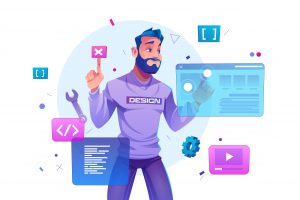
Learning to code has become increasingly important in today’s digital age. Whether you’re a beginner or an experienced programmer looking to strengthen your coding skills, choosing the right coding platform is crucial. With numerous options available, each with its own features and learning resources, it can be overwhelming to make the right choice. In this article, we will explore different coding platforms and provide insights to help you select the one that best suits your learning journey.
1. Online Interactive Platforms
Online interactive coding platforms, such as Codecademy, FreeCodeCamp, and Coursera, have gained popularity for their hands-on learning experiences. Codecademy offers an extensive range of courses covering multiple programming languages, while FreeCodeCamp focuses on web development skills. Coursera, on the other hand, collaborates with top universities to provide comprehensive programming courses.
One of the key advantages of online interactive platforms is their interactive coding exercises and real-time feedback. These platforms often feature an integrated code editor, allowing you to practice coding directly in the browser. The immediate feedback provided helps you identify and correct mistakes, promoting a deeper understanding of programming concepts.
Moreover, these platforms often foster a supportive community where learners can connect with fellow students and instructors. Peer support and collaboration play a significant role in the learning process. You can seek help, share ideas, and engage in discussions, creating a dynamic learning environment.
2. Video Tutorial Platforms
Video tutorial platforms like Udemy and Pluralsight offer a wide range of coding courses presented in video format. Udemy boasts a vast library of courses created by expert instructors, covering diverse topics and programming languages. Pluralsight, on the other hand, focuses on professional skill development and offers in-depth courses for intermediate and advanced programmers.
Video tutorials provide in-depth explanations, demonstrations, and practical examples from industry professionals. The visual nature of video content makes it particularly suitable for visual learners who prefer a more self-paced learning experience. You have the flexibility to pause, rewind, and revisit concepts as needed, allowing for personalized learning.
It’s worth noting that video tutorial platforms often provide certifications upon course completion. These certifications can be valuable for showcasing your expertise and enhancing your resume when seeking job opportunities.
3. Open-Source Learning Platforms
If you prefer a collaborative and community-driven learning experience, open-source platforms like GitHub and GitLab might be the right choice for you. These platforms host repositories of code projects, allowing you to explore and contribute to real-world applications. By engaging with the open-source community, you can gain practical experience, learn from others, and showcase your work to potential employers.
GitHub, the largest code hosting platform, provides an extensive collection of open-source projects in various programming languages. GitLab offers similar features, along with additional project management and continuous integration capabilities. Both platforms facilitate collaboration and version control, essential skills in professional software development.
Contributing to open-source projects not only strengthens your coding skills but also provides an opportunity to build a professional network. Many developers and organizations actively participate in open-source projects, and your contributions can catch the attention of potential employers or collaborators.
4. Integrated Development Environments (IDEs)
IDEs are comprehensive coding environments that provide tools, libraries, and features to streamline the development process. Examples of popular IDEs include Visual Studio Code, PyCharm, and Eclipse. IDEs are ideal for intermediate to advanced programmers who want a powerful coding environment with advanced debugging capabilities, code suggestions, and project management tools.
Visual Studio Code, developed by Microsoft, has gained significant popularity due to its extensibility and broad language support. PyCharm, designed specifically for Python development, offers advanced features tailored for the language. Eclipse, on the other hand, is a versatile IDE that supports multiple programming languages.
IDEs enhance productivity by providing features like intelligent code completion, integrated debugging, and version control integration. They offer a cohesive development experience, enabling you to write, test, and deploy code within a single environment. IDEs are particularly useful for professionals working on complex projects or in specific programming languages.
5. Coding Challenges and Competitive Platforms
If you’re looking to enhance your coding skills through challenges and competitions, platforms like HackerRank and LeetCode offer a wide range of coding problems to solve. These platforms focus on algorithmic and data structure challenges that help you sharpen your problem-solving abilities.
HackerRank, with its extensive library of coding challenges, allows you to solve problems across various domains and programming languages. LeetCode, on the other hand, provides a platform for practicing coding interviews with real company questions.
Engaging in coding competitions can be a fun way to push yourself, learn new techniques, and measure your progress against other developers. These platforms often feature leaderboards, allowing you to compare your performance and see where you stand globally. Additionally, many companies use platforms like HackerRank as part of their hiring process, making it a valuable resource for job seekers.
Choosing the right coding platform is essential for effective learning and skill development. Consider your learning style, experience level, and goals when exploring different coding platforms. Whether you prefer interactive courses, video tutorials, collaborative projects, comprehensive IDEs, or coding challenges, there’s a platform out there to suit your needs.



